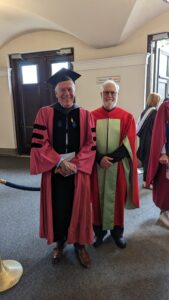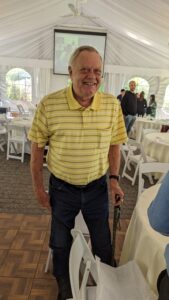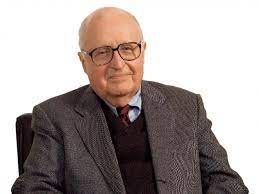Cue up the Brahms, please.
Academics have been my major focus this week, with Convocation (aka Commencement in the US) for the University of Toronto at Scarborough (UTSC) Management Department on Monday and the department’s end-of-year luncheon on Wednesday. Between these events, I read Henry Rosovsky’s 1990 memoir and guidebook, The University: An Owner’s Manual.
Watching on Stage
I was on stage at Convocation and, as an emeritus, in the front row at the side. The pandemic has eliminated handshakes, kneeling, and the handing out of diplomas, greatly speeding up the ceremony. Now students enter the stage from the back and, when their name is called, come forward and then turn right to cross the stage. They all wave at their personal cheering section of family and friends. But only some students realize that the Dean, Principal of UTSC, and President and Chancellor of the University are sitting in the front row and turn to acknowledge them.
For the first time ever, I pinned my Phi Beta Kappa key to my doctoral robes. I posted some years ago discussing how to wear the key – a post that always gets a lot of traffic – and I’m surprised it took me so long to think of this occasion. From now on, I will, as will my colleague Hugh Laurence, who sat beside me.

Honouring Hugh Laurence and James Howard
When I was chair of the Department of Management (1991 to 2003), I would say a few words to colleagues in our luncheons at the end of the calendar year (then known as Christmas parties) and at the end of the academic year. I’m gratified to see that, as the department has grown, my practice has led to my successors presenting a mini state-of-the-union in December and a recognition event in June. The latter includes awards for faculty and staff and honouring retirees.
Several of us spoke about Hugh Laurence and James Howard, who are retiring. Hugh Laurence received his doctorate in anthropology in the Seventies. With anthropology positions non-existent, he went to law school, and then practiced for 25 years in the major downtown firms. He was asked to teach a course part-time and a few years later was hired to a full-time position in strategic management, both returning to academe and starting a new career.
In his 16 years in the department Hugh taught a wide range of courses in law, management information systems, international business, and strategy – reflective of the breadth of his interests. He was asked to serve in several administrative positions and his answer was always “Yes I can.” He served as founding director of our Management and International Business program, vice-chair of the department, and acting Associate Dean of UTSC. Hugh’s teaching was always popular because he drew on a vast store of knowledge and lived experience. His traits of calmness, thoughtfulness, and empathy made him an ideal administrator, especially when dealing with students. Hugh made an enormous contribution to the department and to UTSC in many ways and his combination of polymathism, experience, and character will not be replaced, at least by one person.
Like Hugh, James Howard did not come to the department newly-minted. He had earlier careers in high school teaching and then in acting. As an actor, he appeared on many stages, including Stratford, and in many commercials, which is where the money is.
When the department decided to establish a required course in management communications, James was chosen. Over 23 years, James taught management communications to every student in the program, which often meant helping the students overcome shyness, stage-fright, and linguistic and cultural impediments. James mentored scores of teaching assistants and taught several thousand students. My office was next door to James’ and I was amazed at the number of students lined up to speak to him. I couldn’t help but ask what made him a veritable pied piper. The answer was dedication to his work and interest in his students. James played a unique and essential role in helping students find their voice, and he too will be sorely missed.

Sympathizing with Salieri, not Mozart
I recently watched the celebration of Henry Rosovsky’s life organized by Harvard Hillel. Rosovsky was Dean of Arts and Sciences at Harvard when I was a graduate student, and his name is on my diploma. I met him several times and recall him recounting that he studied Japanese, rather than European economic history, so that his supervisor Alexander Gerschenkron, an expert on Europe, would permit him to complete his dissertation in a reasonable time frame. I too studied economic history with Gerschenkron and sympathized with Rosovsky (as I discussed in a post last year).

Several speakers referred to Rosovsky’s book The University: An Owner’s Manual as a distillation of the wisdom of a great academic career. Though the book predates the Internet (for example discussing the allocation of secretarial staff) and though Rosovsky focuses on his experience at Harvard, there is much to interest academics anywhere. Rosovsky makes a strong argument that the best undergraduate education is at a research-intensive university because it introduces students to faculty who are creating new knowledge. He gives good advice about how graduate students can deal with the challenges of starting an academic career. He explains the attraction of doing research and the researcher’s need for uninterrupted blocks of time to experiment, ponder, and write. He discusses the importance of tenure in protecting freedom of inquiry and enabling professors to risk moving their scholarship in new directions.
But Rosovsky recounts that, as a dean, when he watched the film Amadeus, his sympathies were with Salieri rather than Mozart because the former was a musical administrator who was a “good man of average talent [whose] long life has been devoted to the glory of God and emperor” while the latter was a genius whose “character is infantile and fundamentally unpleasant” (p. 245). Any academic administrator would likely share Rosovsky’s sympathies, but also recognize the need to create a setting that allows genius, sometimes geniuses in their own minds, to flower.
To summarize, I shared the joy of students realizing a milestone and the sense of accomplishment in colleagues reflecting on careers that made important contributions. In reading Rosovsky, I remembered that creating and leading institutions in which these wonderful outcomes can occur is a complicated and challenging task.

Leave a Reply